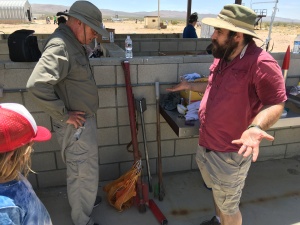The RRS was glad to host another launch event at the Mojave Test Area (MTA) on June 3, 2017. With 71 people in attendance, this was one of the largest events we’ve had in recent memory at the MTA.
Dave Crisalli was our pyro-op for this launch event that had a set of 10 model rocket launches for the MAE 157A class, 3 RRS alphas, 2 RRS betas, and another cold flow test series by the UCLA liquid rocket team in preparation for the FAR-MARS competition. Dave Crisalli was kind enough to allow me (Dave Nordling) to assist on the micrograin launches to gain experience as a pyro-op.
It was also new member Bill Janczewsky’s first time at an RRS MTA launch event. We thank Bill for taking pictures of the launches. If anyone else has photos to share from the event, let me know.

Before we got started, we held our safety briefing with everyone in attendance. The briefing also introduced everyone to the purpose of each of the buildings and structures, how the testing will be conducted and outlined the unique and common hazards at the MTA.
Dr. Mitchell Spearrin of UCLA brought his MAE 157A undergraduate class for the final weeks of the rocket build and trajectory lab. Ten custom rockets were built using F-motors and flying an altimeter chip with a hard-boiled egg on each. Surprisingly, more than half recovered their eggs with the shells in tact. Data was taken on each flight with good consistency, one trajectory I viewed from a smartphone application showed a maximum altitude of 2000 feet. All vehicles were recovered. I hope UCLA will send the RRS a compilation of their results to post here soon.
Preparation for the micrograin launches took some time. Osvaldo and I did the mixing and loading. Larry completed the assemblies with the burst disk and nozzles.
During the preparations for the micro-grain rockets (RRS alphas and betas), We managed to get the LNG tanks unloaded from the truck. Many thanks for the extra help given by the students of UCLA. The LNG tanks will be very useful additions to the liquid rocket projects at the RRS. With luck, we’ll acquire an oxygen dewar to provide the oxidizer supply to our small engine development projects.
Richard Garcia also managed to find an old beta that Osvaldo launched last year with a parachute recovery system. We are thankful to the folks at FAR for finding and holding on to the vehicle as they must have found it downrange for us.
The recovered beta also had a graphite throat insert which held up very well.
Mars City Design held their “Evening on Mars” gala fundraiser on May 25th.
The RRS donated an alpha rocket to the raffle held at the event.
Mars City Design.com
The winners were part of a film crew from Finland called “Fun Academy” which is part of the larger organization, “SpaceNation.org”.
Fun Academy
Space Nation
The RRS was glad to support Space Nation in their production at the MTA launch event. We hope the crew can share some of their best still images and video from the launch. The crew had a drone camera which should have captured an excellent perspective.
The UCLA liquid rocket team conducted another series of cold flow tests. The testing captured the pressure, temperature and flow rate profiles which met predictions. UCLA is working hard after their PDR was held this week in preparation for next year’s Mars Society liquid rocket competition at the Friends of Amateur Rocketry site.
Mars Society – liquid rocket competition at FAR
The last event was the micrograin rocket launches. UCLA had two RRS standard alphas and two standard betas for demonstration of the larger and more powerful amateur rockets. The RRS launched a third alpha that day with a yellow body and fins. With all attendees safely undercover, the launch did not fail to impress!
With all of the action, it made for a very late day. With the temperature exceeding 100 Fahrenheit that day, most people didn’t have the strength to hunt for the UCLA alphas or betas after launch. The sound of impact was very, very faint, but a couple hits were heard.
Before the day’s micrograin launches, the alpha rails were turned slightly north from due west before the launch as the alphas seem to be falling more and more to the south. Impact on one of the alphas seemed to be due west. The impact on the second beta was heard in the southwest. Winds were low to very light and pushing to the east so I would expect to find the vehicles closer to the launch site. With time, we hope to recover all of them and recover some of the parts.
In particular, the second beta was outfitted with an altimeter chip. The aluminum payload tube was vented with holes. Although the metal tube would shield the signal from the transmitter. the chip has memory storage that could be recovered if the rocket is found not too long from now.
It was a long and hot day for everyone. Most objectives were accomplished and we hope to support UCLA in further testing including the hot fire of their liquid rocket when they are ready.
Our next monthly meeting is next Friday, June 9th, at 7:30pm at the Ken Nakaoka Community Center in Gardena, California. We have been fortunate to have many new student members join us from UCLA and we hope they continue to be active with the RRS.
If there is anything that I missed or misstated, please let me know.
secretary@rrs.org































